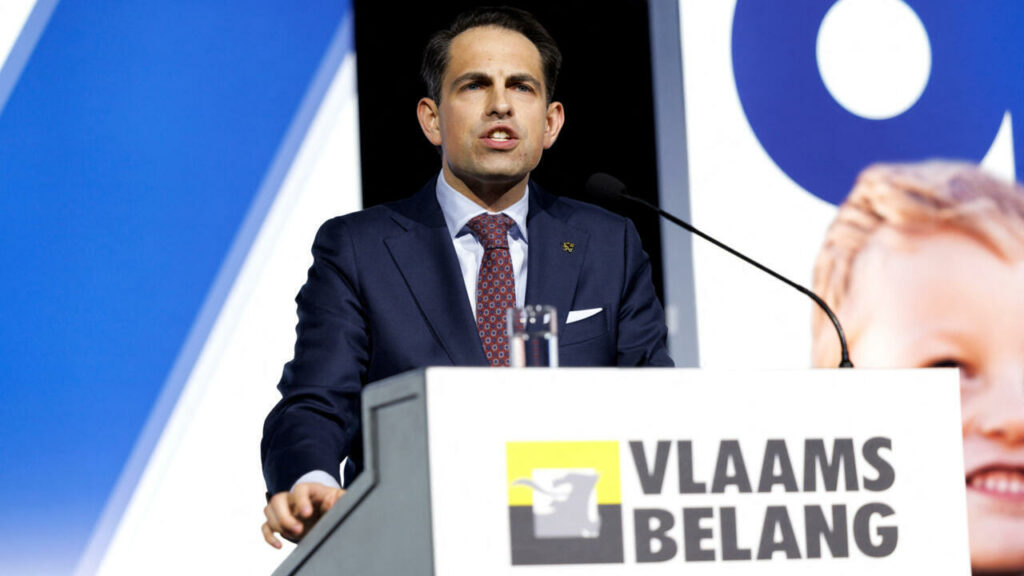Read moreHow France’s ‘great replacement’ theory conquered the global far right
“It’s a party that has very clearly adopted this theory and uses it a lot in its campaign”, Biard said.
Vlaams Belang’s campaign has largely played out on social media, targeting young people first and foremost. Belgium, where voting is mandatory, has recently lowered the voting age for the upcoming European elections to 16 – effectively creating an additional 270,000 eligible voters.
“Vlaams Belang has a younger electorate than the average for all the other parties combined,” Biard said.
A recent poll by the Flemish High School PXL and TV Limburg showed that 24.9 percent of Flemish first-time voters intend to vote for Vlaams Belang, ahead of both the Flemish green party “Groen” and the nationalist N-VA.
According to the survey, friends and social media play a decisive role in young people’s voting behaviour – a detail that Vlaams Belang has not overlooked.
In 2023, the party spent 1.7 million euros to advertise on Meta (Facebook and Instagram), according to the latest AdLens report.
Accept
Manage my choices
Difficult footing in Wallonia and Brussels
In Wallonia, Chez Nous is the third-most “influential” political account on social networks, at least measured in the reactions it generates.
Yet the far-right Walloon party, founded less than three years ago, is struggling to establish itself in the polls.
Apart the party’s lack of maturity, Chez Nous remains on the sidelines partly due to the region’s different priorities.
“The Walloons are primarily concerned with socio-economic issues, purchasing power and the healthcare system”, Biard said, adding that Wallonia has a relatively high unemployment rate (8 percent in the fourth quarter of 2023) compared with Flanders, which boasts of near-full employment (3.5 percent).
The political and media “cordon sanitaire” is another key factor.
Introduced in two stages in 1989 and 1992 among Flemish political parties, this particular agreement in Belgium is aimed at preventing far-right political parties from forming any political majority or coalition government by refusing to cooperate or even hold talks with them.
This precaution has also been extended to the media in French-speaking regions in Belgium – not the case in Flanders – meaning that the main media outlets there neither receive nor interview representatives from far-right parties.
Civil society is also very active in blocking the far right: anti-fascist activists regularly try to prevent Chez Nous meetings from taking place by obstructing events or calling on local authorities to ban them.
In addition to these external factors, internal discord also prevents Chez Nous from gaining ground, Biard said, highlighting what he described as “internal tensions within the party and difficulty in finding a charismatic leader”.
Biard also noted a “weak sense of national identity” in French-speaking Belgium, which contributes to Chez Nous’s unpopularity.
As one of Chez Nous’s backers, Vlaams Belang has agreed not to submit an electoral list in Walloon constituencies in order to avoid splitting the vote.
In exchange, Chez Nous leaves the field open to Vlaams Belang in the Brussels region, where the Flemish party is credited with 3 percent of voting intentions, far behind the Mouvement Réformateur (21.8 percent), according to the latest polls.
Gaining ground in the European Parliament
In the European Parliament, where Belgium has 21 seats – it will gain one more in the next elections – the far right currently holds three: Gerolf Annemans, Filip de Man and Tom Vandendriessche, all three members of Vlaams Belang.
“That’s not bad if you consider that not all seats go to the Flemish constituency,” Biard said. Only 10 out of the 21 seats go to representatives of the Flanders region.
The three Vlaams Belang MEPs belong to the Identity and Democracy (ID) group, formerly known as Europe of Nations and Freedoms (ENL), which the Flemish party co-founded alongside the former French Front National, the Italian Northern League, the Austrian FPÖ and the Dutch PVV.
Unlike the European Conservatives and Reformists (ECR) group, which is composed of more disparate right-wing and far-right parties, including members of Fratelli d’Italia, Reconquête, Greek Solution and N-VA, the ID group consists only of clearly identified ultranationalist and far-right parties.
Given the number of seats allocated to Belgium and the proportional representation system that favours vote splitting, Vlaams Belang is likely to retain a minimum of three seats, Biard said, adding that the party may even hope to win a fourth.
Despite the relatively small number (compared with a total of 750 lawmakers), acquiring a fourth seat in the European parliament would show that the far right has the potential to gain more influence in the EU and in Belgium, Biard said.
Far from being an isolated case, the rise of Vlaams Belang reflects broader trends within the far right across Europe, from the Netherlands to Italy, Hungary, Finland and Bulgaria.
Polls predicting European election results show far-right parties taking first place in at least nine EU member states, and second or third place in nine others.
This article has been translated from the original in French.
Source link : https://www.france24.com/en/europe/20240422-in-belgium-the-flemish-far-right-gaining-ground-ahead-of-european-elections
Author :
Publish date : 2024-04-22 07:00:00
Copyright for syndicated content belongs to the linked Source.
